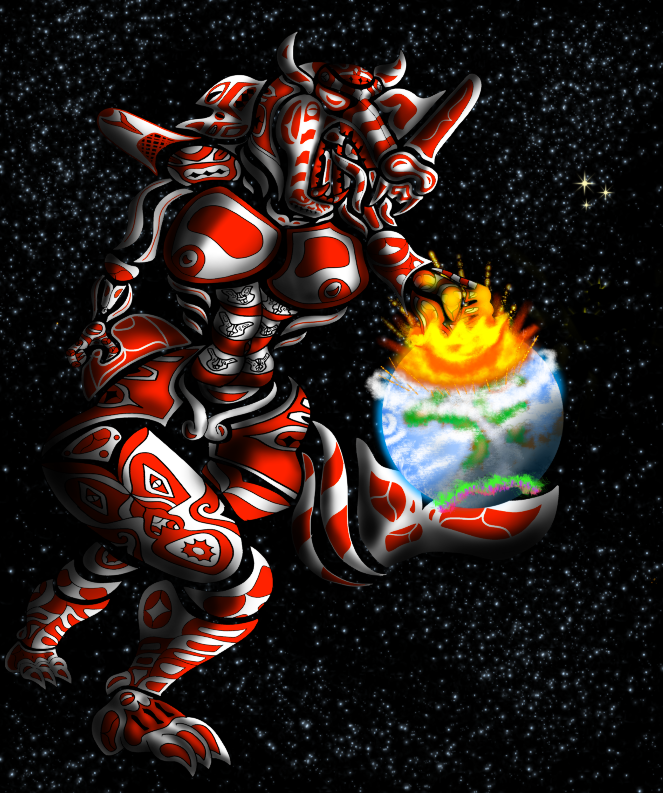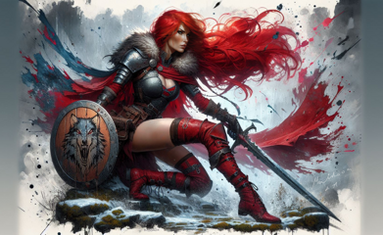HOME | DD
 jdstephens2 — Kia'mach's Wrath
jdstephens2 — Kia'mach's Wrath

#formline #fantasygods
Published: 2023-09-20 20:28:15 +0000 UTC; Views: 2078; Favourites: 4; Downloads: 0
Redirect to original
Description
The Beast in the Pit. She Who Stirs. Fire and Frost. Dame of All Ailments. The Last Note. Mother Dragon.
Kia’mach.
In a different time, the universe was the toy of the Distant Ones. The only qualities they possess that thinking beings can recognize is that they were spiteful, greedy, and cruel. Everything contorted at their mad whims, and even the mortal gods were afraid of them and could not restrain them.
The gods were unwilling to have children in that unhappy time, until the God of Seers, Ternovek, urged it of Macharak and Kerzova, an unhappy pair whose lot it was to be king and queen of the gods and of the world as it lay prostrate and warped before the Distant Ones. Ternovek’s heart was very heavy, for of course he knew what would happen. But he reasoned to his lord and lady that as strongest of gods, that if they brought up any children those new deities might be strong enough to shield the world from the Distant Ones.
They tried repeatedly, and succeeded, but as they feared the children they begot were still only fit to be the slaves of the madness of the Distant Ones as their parents had been. There were gods of life, and death, and time, and others, though they were young and weak and new as life, death, and time were. Ternovek told them to keep trying, and as he foresaw all, they trusted in him. Lady Kerzova swallowed the seed of all the other gods together, and impregnated her husband.
Macharak groaned to feel the power of the child in him, but called his court and family together to witness the birth. Some time later, Kia’mach tore herself free from him, scattering him across the sky. Horrified, Kerzova moved to strike at her husband’s killer, but it was fruitless and her blood stained the heavens. The other gods fled from the beast as it grew (Ternovek has missed the birth, having already found a safe place to grieve), but it devoured them all. Only the Young Gods and the least popular and most distant of the Old Gods escaped, the former for being small and fast and easily hidden, the others for not being present at the birth.
Even Kia’mach could not more than irritate the Distant Ones like a mosquito, but she exhaled great vapours and hid the world under cloud, and the Distant Ones could not find something so small in the cloud and soon grew bored looking for it but continued their mad play with other amusements and less fortunate worlds. The world was cold and dark, but now subject to the caprice of Kia’mach, who ruled all.
In time, the Young Gods, of which Kia’mach of course was one and the greatest, grew up, and wearied of a cold and lifeless world they lived on. Some proposed to reason with Kia’mach, and were devoured. Some that she be fought, and were slain. Some that she be appeased, but nothing could satiate. Finally, Zammatri made a device, a flute, and blew some notes on it to amuse himself in the grey boredom of the dragon’s domain. Kia’mach nodded almost at once, and Zammatri played, and the dragon stilled.
Seeing this, the other Young Gods buried her under the world like a blanket to aid her rest, and all took up instruments of their own and played along, and the dragon slept. The vapours cleared, and sunlight reached the world, and life grew up. Sometimes, the gods quarrel, and the notes are discordant, and the dragon stirs. So far she has never woken up, but when she does so she will cast aside the world like any other blanket, and then she may be very cross with her siblings for lulling her indeed!
Every note in the song is the soul of a thinking being. They are loudest when born from the instruments of the gods, and, at their death, join the Eternal Chorus, forever lulling Kia'mach. Cruel and wicked mortals are necessary to keep the song from growing monotonous and boring Kia’mach to movement, but too many and she will stir and the world will suffer.
Kia’mach stirs as the earthquake that topples palaces, inhales as winter’s biting cold, exhales as summer’s baking heat. Of all things that live, she has had the most contact with the Distant Ones, and is tainted, so constantly gives off like germs all the maladies that trouble the world, like madness, envy, and cancer. These the Young Gods can fight, but the battle is never-ending. So Kia’mach sleeps on, and may she never wake.
---
Every Fantasy pantheon needs a suitable evil god, but I really wasn’t sure how to depict Kia’mach (Kai-a-MAK), god of disaster and disorder. She was the chief deity of much of the Rodentia in the Black River Basin pre-Saurian contact, and her traits are pretty directly traceable to local geography: Voskilli is both very mountainous, has a continental climate over much of its surface, and is riddled with volcanoes, the eruption of which is coincidentally her most potent symbol. Tidal waves, earthquake, rockslides, avalanche, eruptions that hide the sun and rain razor-sharp ash, invisible tides of carbon monoxide, forest fire, lava flows, and scalding pools of boiling water are all frequent obstacles, aside from the constant challenge the mountains pose to navigation and the yearly cycle of intense heat and cold. It is hard to live there too long and not forgive ancient peoples for suspecting that the landscape was somehow out to get them.
Kia’mach was very popular to depict on temple walls, especially rampaging (apparently she can both sleep and conceal her full might while also destroying significant sections of the world), or peacfully sleeping and curled up on prayer wheels as a symbol of peace and good luck. When described verbally or in literature, she is usually depicted as having very muscular yet very feminine figure of indistinct anthropomorphic species with the horns of both a woolly rhino and of a young mule deer, the limbs of a bear, the talons of an eagle, and the tail of a whale. Her belly is full of consumed souls and the fins of fish run down her snout, crest, and back.
She is seldom proscribed much moral agency one way or another, but is usually just depicted as an amoral destructive force that can’t be appeased (a fortunate convention that probably saved many a virgin from being tossed into erupting volcanoes) or reasoned with. Despite this, she was still co-opted by organized religion as a moralizing figure, with the threat that immoral actions would contribute to natural disaster and the breaking of the world. The world not being eaten by a celestial dragon is something of a public good that encourages free-riding, but it seems this couldn’t be helped.
Kia’mach is the goddess of disorder, associated with lawlessness and broken social contracts –the killing of brothers and sisters, maltreatment of elderly parents, abandonment of children, cheating of clients, theft from neighbours, betrayal of one’s lord and abuse of one’s vassals, dishonesty to the gods and littering in public places- a repeat spectre in the hierarchal Voskillian world. For this reason, she has also been often patronized as a symbol for those who got the sharp edge of civilization, everything from edgy youth to serious anarchist, heretical, or anti-statist groups. She is also used as a charm to ward off what appears to be a very particular kind of evil spirit, usually depicted with tentacles and somehow connected to the Distant Ones, about whom there is very little theological record.
For influences, her name is just a corruption of ‘Tiamat’, who was on my mind while trying to think of an origin story. Obviously many Fantasy settings treat their world as a song, everything from Tolkien and C.S. Lewis to The Elder Scrolls and the appropriately named ASOIAF. In this case, I was proud of making Mortals the instrument in question, and giving their song a higher purpose (much like how the Tapestry of History in Wheel of Time is spun using mortal lives as threads), though I imagine that is cold comfort. Playing a lullaby to still a mad god is straight out of Azathoth, while her characterization is similar to Set, as a wicked god who nonetheless has an important role in protecting the world from powerful destructive forces like Apopthis, while a great dragon living in the Earth and chewing away at it is just the Nidhogg.
She didn't turn out quite like I had hoped(who does?) but I was actually pretty happy with how I drew the planet itself, I'm certainly still scared of drawing planetary bodies. Had a devil of a time trying to draw Formline at both 3/4 and in perspective. 3 stars of course, because this is Vosk and 3 just looks cool, even though only 2 are visible from the world's surface.
Thanks for stopping by, feel free to leave a comment, and have a great day!
Regards,
JD
Timestamp: 12 hours or so.






















